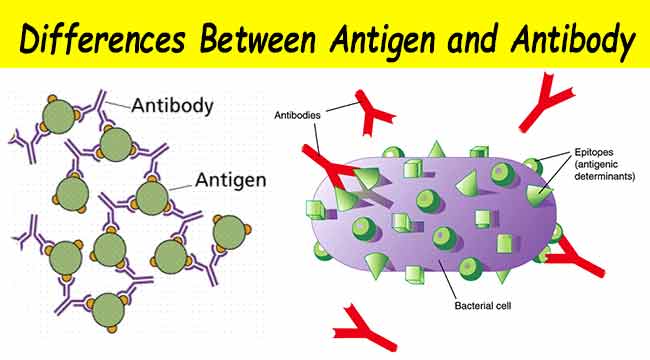-Change shape to keep attacking the antigen. View the full answer.
Difference Between Antigen And Antibody Definition Characteristics Function
PCR tests look for pieces of SARS-CoV-2 the virus that causes COVID-19 in the nose throat or other areas in the respiratory tract to determine if the person has an active infection.

. As nouns the difference between antibody and antitoxin is that antibody is immunology a protein produced by b-lymphocytes that binds to a specific antigen while antitoxin is an antibody that is capable of neutralising specific toxins that are causative agents of disease. However antigens can also have nucleic acids carbohydrates and proteins as their molecular type. On the other hand an antigen is a foreign substance usually harmful that induces an immune response thereby stimulating the production of antibodies.
Previous question Next question. -Marks foreign cells for destruction. Antibody--An antibody is a protein produced by a host to bind to and thus inactivate foreign particles.
Antibody differs from antigen because antibody are the immune fighterswarrior. A positive antigen test means that the person being tested has an active COVID-19 infection. A protein that binds to the antigen to elicit an immunological response.
Antigen and antibodies are two very different entities. In a nutshell an antibody is a glycoprotein which is produced in response to and counteract a particular antigen. It is frequently but not always a protein.
Antibodies or immunoglobulins are glycoproteins consisting of identical heavy chains and 2 identical light chains that recognizes a specific epitope on an antigen and facilitates elimination of that. Antigen is any foreign particle that elicits an immune response or that specifically binds to an antibody or a T-cell receptor often used as a synonym for immunogen. Differences between COVID-19 rapid antigen and antibody tests Antigen tests Covid-19 antigen tests detect the Corona virus proteins from nasopharyngeal swab but in the case of Covid-19 antibody tests detect the presence of antibodies against the v.
An epitope also known as the antigenic determinant is that part of the antigen to which antibodies bind. The epitope is the specific part of the antigen to which the antibody binds. Immunogen- substance capable of inducing an immune response all of these are antigens.
Differences between antigen and antibody. An antigen is a type of molecule that interacts with the constituents of the immune system specifically the antibody. Antigen- any substance that has the ability to interact with B cell receptors T cell receptors TCR or antibody Ab not all these are immunogens.
Here are the critical differences between antigens and antibodies Antibodies also known as Immunoglobulins have protein a molecule type while antigens have a lipid molecular type. The difference between antigen and antibody is mainly due to the following factors like functional role specificity factor and foreignness. Difference-Between-Antigen-And-Antibody Antibodies are not found at a place as such but whenever our immune system encounters antigen or a pathogen B cells get activated immediately releasing antibodies into the bloodstream.
Both antigen and antibody are specific. Antibodies are produced by the immune system in response to antigens material perceived as foreign. Topic PCR Test Antigen Test Antibody Serology Test Why is the test used.
A doctor tells us an antigen test shows if you have the COVID-19 virus and could be infections where an antibody test suggests if youve had the virus in the past. -Recognizes foreign cells by carbohydrate chains coming off of their cell membrane. A positive antibody test means that the person being tested was infected with COVID-19 in the past and that their immune system developed antibodies to try to fight it off.
Antigen tests look for pieces of proteins that make up the SARS-CoV-2 virus to determine if the person has an active. The key difference between antigen and antibody is that antigen is any substance that induces the immune system to produce antibodies against it while antibody is a Y shaped immunoglobulin protective protein that is capable of binding with antigens in. AntigenAny foreign particle that enters our bodyAnything that stimulates an immune responseiecauses the production of antibodiesAntibodies are substances produced by the body to eliminate antigens to prevent damage to the host body.
5 rows Antigens are mostly made up of proteins but they may also be nucleic acids carbohydrates or. There can be more than one epitope. The particle is called the antigen.
Antigens cause disease while antibodies fight them. While the antigen evokes the antibody response in the host the antibody doesnt bind to the entire protein but only to that segment called the epitope. We explain both and how they work.
Antigen incites the immune system whereas the antibody is produced in response to a specific antigen. The antibody response to a particular antigen is highly specific and often involves a physical association between the two molecules. Thankfully enough the body can distinguish between foreign and natural cells and produce antibodies against them.
The binding of antibody to antigen is very specific so that if View the full answer. -Produced to help immune system. Antigens and antibodies work together in your immune system.
This association is governed by biochemical and molecular forces.
Difference Between Antibody And Antigen Test Difference Between

Differences Between Antigen And Antibody

Difference Between Antigen And Antibody Antigen Vs Antibody Youtube
0 Comments